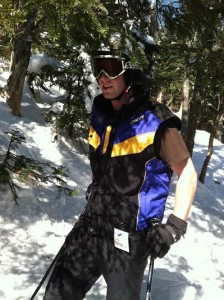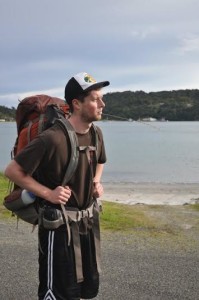1) Where is home for you?

I spent my younger years in the suburbs of Massachusetts, where apple orchards and golf courses abound. My true formative years, however, were spent at St. Lawrence University in upstate New York. Upon graduation, I moved back to the great state of Massachusetts to live and work in Boston. In order to escape the hustle and bustle of the city, I would venture to the wilderness of Vermont and New Hampshire during the weekends. Having spent time all over the Northeast, and developed a fondness for many of the states in the region, I would say that the Northeast is my home.
2) Where are you on your higher education path?
I am halfway through a 2-year Masters program in Environmental Management from the Nicholas School of the Environment at Duke University. My program concentration is Environmental Economics and Policy with a focus on climate change policy and environmental politics.
3) Why did you choose to work in the environmental field?
Having spent much of my childhood outside, I developed a fondness for nature at an early age. This fondness for nature was further reinforced through my involvement with Tom Denney Nature Camp (TDNC). I attended TDNC as a camper starting in 2nd grade, and eventually went on to become the Director of the camp 14 years later, after having been involved every summer in between.
Alas, having accepting a full-time job upon graduating from St. Lawrence, I was forced to give up my summers as an outdoor educator at TDNC. After working for a few years in a typical 9-5 corporate job, it became apparent that I would not be happy toiling away at something that I did not feel passionate about. So, I decided to explore other options. Given that I think climate change is the greatest threat facing the United States and the world, I decided to redirect my career trajectory to a place where I can help the world prepare for and mitigate the massive impacts that are going to affect not just our daily lives, but the manner in which nations interact in a changing geopolitical framework.
4) What are some of your fondest memories of being out in North Carolina’s natural wonders?

The Triangle has some excellent mountain biking trails, including (but not limited to) Lake Crabtree, Carolina North Forest, New Light, and Beaver Dam. It is such a joy to get out on the trails and empty your mind of the stress of everyday life. The amount of stewardship that goes into the mountain biking trails around the Triangle is astounding. I am so thankful to the groups and individuals that have devoted their time and energy to developing and maintaining these trails.
5) What are your internship responsibilities this summer with the NC League of Conservation Voters (NCLCV)?
I am working to ensure that anti-environmental policies that pose a threat to North Carolina water quality, human health, or environmental well-being do not become law. I achieve this through tracking legislation and informing members of the General Assembly and the public about harmful bills before they become law. I will also hold legislators accountable through the annual scorecard and work with NCLCV staff to elect pro-environmental leaders.
6) How do you see this opportunity as a Stanback intern affecting your future education and work?
I have already learned a great deal about the inner-workings of a state legislature and the accompanying politics. I have also been exposed to a wide array of environmental issues and the endlessly complex multi-stakeholder dynamics associated with them. I will carry this knowledge to the classroom next year to help inform analysis of environmental policies. In addition to providing new perspectives in the classroom, this internship will act as a launching pad into state-level politics in Massachusetts, where I hope to become a champion for more aggressive climate change policy.



